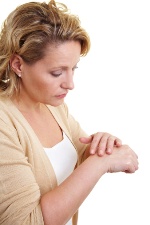 Burdock is a herbal secret originally from Asia, but has spread through Europe and the U.S. It is a close cousin of thistle, commonly found in our forests. In the soil, burdock projects deep roots. It is these roots that transform this would-be weed into potential medicine.
Burdock is a herbal secret originally from Asia, but has spread through Europe and the U.S. It is a close cousin of thistle, commonly found in our forests. In the soil, burdock projects deep roots. It is these roots that transform this would-be weed into potential medicine.
PLUS: Keeping Healthy, Youthful Skin
The root of this weed purifies the blood, according to traditional herbal medicine, and helps clear away toxins. This has a direct effect on the kidneys, acting as a diuretic of sorts, relieving skin problems. For problems like eczema, burdock has proven to be an effective traditional remedy either on its own or in combination with another remedy.
The herb contains carbohydrates, volatile oils, tannins, fatty oils, and plant sterols. Scientists aren’t clear which ingredients within burdock root are active; i.e. the ones responsible for its healing properties. But, it is believed that burdock carries anti-inflammatory, antioxidant, and antibacterial qualities.
If you speak to most experts of herbal medicine, they will tell you that burdock can effectively help conditions of the skin, and even others caused by inflammation—osteoarthritis, gout, and rheumatoid arthritis, to name three. Burdock root is found in many herbal products because of these abilities. There remains, though, a frustrating lack of available evidence and studies themselves.
Burdock is one of the most widely recommended herbs for three frustrating skin problems: eczema, psoriasis, and acne. You can take it internally or externally. You can buy fresh or dried roots, root powder, a “decoction,” which is a liquid made after boiling the herb, a “tincture,” which is a solution of burdock in alcohol, or a herbal extract.
If you buy dried root, steep up to six grams in 2/3 cup of boiling water for 15 minutes. Drink the liquid three times a day. Or, you can soak a thin cloth in the liquid and then wrap it (once cool) around the affected skin. This technique is known as a “poultice.” If you buy a tincture, you should take between 8 and 12 millilitres, three times a day. You can also perform the poultice option with this. In a health store, you may find topical burdock remedies. Look around, and feel free to ask employees: they are typically knowledgeable, and love to answer questions and deliver health advice.
Burdock is safe, but those with kidney or liver disease (as well as nursing or pregnant women) should not take it, just in case. Also, if you are diabetic and taking insulin or medications, talk to your doctor, because burdock may increase the effects of these.
